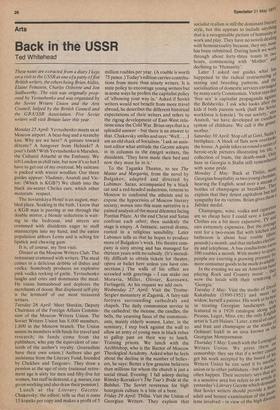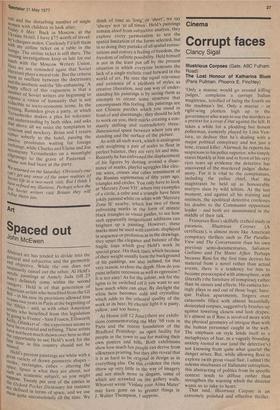Arts
Back in the USSR
Ted Whitehead
These notes are extracted from a diary I kept on a visit to the USSR as one o fa party of five British writers, the others being Brian Aldiss, Elaine Feinstein, Charles Osborne and Jon Stallworthy. The visit was originally proposed by Yevtushenko and was organised by the Soviet Writers Union and the Arts Council, helped by the British Council and the GB /USSR Association. Five Soviet writers will visit Britain later this year.
Monday 25 April: Yevtushenko meets us at Moscow airport. A bear-hug and a scratchy kiss. Why are we here? A gesture toward détente? A hangover from Helsinki? A poet's faith? With Yevtushenko is Marsden, the Cultural Attaché at the Embassy. We left London in chill rain, but now it's so hot! have to get out of my overcoat. My suitcase is packed with winter woolliest Our three guides appear: Vladimir, Anatoli and Victor. (Which is KGB?) We climb into the black six-seater Cheika cars, which other motorists respect.
The Sovietskaya Hotel is an august, marbled place. Soaking in the bath, I know that a KGB man is peering at me through the double mirror, a blonde seductress is waiting in the bedroom, and streets are crammed with dissidents eager to stuff manuscripts into my hand, and the entire population abhors Lenin and is aching for lipstick and chewing gum.
It is, of course, my first visit.
Dinner at the Moscow Writers Club. The restaurant crammed with writers. The meal comes in a delicious dribble of dishes and vodka. Somebody produces an explosive pink vodka reeking of garlic. Yevtushenko laughs and cries and dominates the meal. He toasts humanhood and deplores the merchants of doom. But displaced self-pity is the leitmotif of our most treasured writers.
Tuesday 26 April: Meet Shes kin, Deputy Chairman of the Foreign Affairs Commission of the Moscow Writers Union. The Soviet Writers Union has 8,000 members, 1,800 in the Moscow branch. The Union assists its members with funds for travel and research; its funds come from the publishers, who pay the equivalent of onetenth of the author's royalty. (Journalists have their own union.) Authors also get assistance from the Literary Fund, founded by Chekhov and Turgenev. They draw a pension at the age of sixty (national retirement age is sixty for men and fifty-five for women, but staff in demand, e.g. nurses, can go on working and also draw theirpension).
Lunch at the Literary Gazette. Chakovsky, the editor, tells us that it costs 15 kopeks per copy and makes a profit of 5 million roubles per year. (A rouble is worth 75 pence.) Today's edition carries contributions from more than ninety writers. It is state policy to encourage young writers but in some ways he prefers the capitalist policy of 'elbowing your way in.' Asked if Soviet writers would not benefit from more travel abroad, he describes the different historical expectations of their writers and refers to the zigzag development of East-West relations since the Cold War. Brian says that is a splendid answer — but there is an answer to that. Chakovsky smiles and says: 'Well. . . I am an old shark of Socialism.' I ask an assistant editor what attitude the Gazette adopts in its columns to the émigré writers, the dissidents. 'They have made their bed and now they must lie in it.'
To the Taganka Theatre, to see The Master and Margarita, from the novel by Bulgakov, adapted and directed by Lubimov. Satan, accompanied by a black cat and a red-headed seductress, returns to Moscow to confound the atheists and to expose the hypocrisies of Moscow literary society; woven into this main narrative is a pained analysis of the moral dilemma facing Pontius Pilate. At the end Christ and Satan confront each other; then suddenly the stage is empty. A fantastic, surreal drama, rooted in a religious sensibility. Later Lubimov tells us that he hopes to produce more of Bulgakov's work. His theatre company is sixty strong and has managed for thirteen years with no subsidy. (It's incredibly difficult to obtain tickets for theatre, opera or ballet here unless you have connections.) The walls of his office are scrawled with greetings — I can make out Moravia, ' Miller, Olivier, Kurosawa, Ferlingetti. At his request we add ours. Wednesday 27 April: Visit the TroitseSergiev monastery at Zagorsk. A fairy-tale fortress surrounding cathedrals and chapels. The daily communion service in the cathedral: the incense, the candles, the bells, the yearning faces of the communicants, mainly elderly women. Later, in the seminary, I step back against the wall to allow an army of young men in black robes to gallop past on their way to lunch. Training priests. We lunch with the Archbishop, who is the Rector of Moscow Theological Academy. Asked what he feels about the decline in the number of believers, he says: Better a few genuine believers than millions for whom the church is just a social ritual. Evening: I fall asleep during Rimsky-Korsakov's The Tsar's Bride at the Bolshoi. The Soviet reverence for high bourgeois culture is a bite of a bore.
Friday 29 April: Tbilisi. Visit the Union of Georgian Writers. They explain that
Spectator 21 May t977 socialist realism is still the dominant literarY style, but this appears to include anything that is a recognisable picture of humanity at work and play. They have no novels dealing with homosexuality because, they say, none has been submitted. During lunch we work through about forty-three toasts in rw°,, hours, commencing with 'Mother' and declining to 'Humanity'. Later I asked our guides what has happened to the radical restructuring mating and breeding patterns, and the socialisation of domestic services envisage' by many early Communists. Victor says that 'free sex' is capitalist propaganda against the Bolsheviks. I ask who looks after the kids if both parents work (half the Soviet workforce is female). 'In our society,' saY: Anatoli, 'we have developed an excellen; system of childcare. We call it the gran'.
mother.'
Saturday 30 April: Stop off at Gori, Stalin's birthplace. A block of flats now ove„si the house. A guide takes us round a series'a heroic-style pictures illustrating his life,1 collection of busts, the death-mask. Oil here in Georgia is Stalin still remembere with some pride. Monday 2 May: Back at Tbilisi, 07 Georgian hospitality as two young cheinist„i hearing the English, send over a stream; bottles of champagne at breakfast. Thei explain that they detest capitalism hut fe a Jubilee medal.
Champagne,victims. Brian gives them
Champagne, wine, vodka and cigarettes are so cheap here I could save a fortuned' Clothes are a bit more expensive, TV atie cars extremely expensive. But the averagd rent for a two-room flat with kitchen alle bathroom is about four rouble pounds) a month, and that includes elect ity and telephone. A bus conductress ear!, 300 roubles a month. With money to 5P1 people are exerting a growing pressure*. more consumer goods to be made availn%d In the evening we see an American ha"y playing Rock and Country music ' riled wow the locals with their rendering 'Georgia.' Tuesday 3 May: Visit the studio Of l'n'avi,i-ds Kakabadze (1890-1952) and meet widow, herself a painter. His work at its",5 in treating Georgian landscapes. featured in a 1926 catalogue along sy,?,11 Picasso, Leger, Miro, etc; the only Eagji,l'es artist is 'Lett Haines.' Later, a meal of ea'of and fruit and champagne at the studinio Ochiauri lrakli in an area known as t Georgian Montparnasse. Thursday 5 May: Lunch with the Leningrol Writers Union. We press their ot censorship: they say that if a writer cannhis get his work accepted by the board Of, % er Writers Union he can send it to aa°t" union or to other publishers — but it does often happen. Their secretary says that seio is a sensitive area but refers to an articleds yesterday's Literary Gazette which delnano that Soviet writers should provide a adult and honest examination of the nrnce lems involved — in view of the high div°r rate and the disturbing number of single vit.,nrnen with children to look after. c,riday 6 mar Back in Moscow, at the ;-'1(raine Hotel, I have E75 worth of travelJer's cheques stolen. Carelessly I'd left them twitb nlY airline ticket on a table in the °unge. The airline ticket is still there. The !lisuing investigations keep us late for our ,alich with the Moscow Writers Union. ,fere we are reminded again that Soviet literature plays a moral role. But the criteria seem to oscillate between the doctrinaire Laud the aesthetic and the 'life-enhancing.' A "aPPY effect of this vagueness is that a number of Soviet writers are beginning to express a vision of humanity that is not reducible to socio-economic terms. In the eyvening, Ramsden gives a party, at which evtushenko makes a plea for tolerance tand understanding by both sides, and asks at above all we resist the temptation to eYnieism and mockery. Brian and I return rather soberly to the hotel, 'passing the exehan Passive prostitutes waiting for foreign age, while Charles and Elaine and Jon neleempany Yevtushenko on a moonlight rimage to the grave of Pasternak — 'iose son had been at the party.
returned on the Saturday. Obviously one csoa"'t get any sense of the inner, realities of h viet life in a two-week visit. But I think I Ive refined my illusions. Perhaps when the refi Sciviet writers visit Britain they will
ne theirs too.



































 Previous page
Previous page